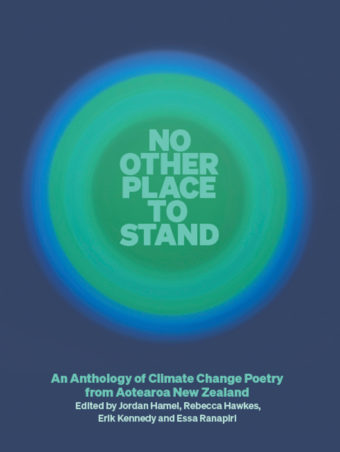No Other Place to Stand: An Anthology of Climate Change Poetry from Aotearoa New Zealand is a book blessed with editors aware of their project’s limits, yet ambitious enough to present a varied abundance of concerns, forms and poetic voices. Jordan Hamel, Rebecca Hawkes, Erik Kennedy and essa ranapiri are simultaneously resolute and self-aware as they introduce their selection. ‘A poem may not be a binding policy or strategic investment,’ they write, ‘but poems can still raise movements, and be moving in their own right. And there is no movement in our behaviours and politics without a shift in hearts and minds.’ This, then, is what the anthology sets out to do — not to reform climate deniers, nor really to offer a scientific education, but to move. And it succeeds. The work chosen for this book is so abundant, diverse, and urgent, that any reader — however cynical — will be jostled by it somehow.
There’s an untidiness in the editors’ refusal to restrict the anthologised material strictly to concerns or stories from Aotearoa. That’s fitting, partly because there is no experience of climate change that belongs solely to this country — it is, of course, a planet-wide event — and partly because so many of the people of Aotearoa whakapapa to, and are touched by, so many other parts of the world. Australia-centred poems by Laniyuk and Dadon Rowell flow into Victor Billot’s Scott Morrison-dedicated piece, which is followed by Tusiata Avia’s bitter ode to Jacinda Ardern, titled ‘Jacinda Ardern goes to the Pacific Forum in Tuvalu and my family colonises her house’. The melting, burning, crumbling and rage of the Anthropocene cannot be neatly sorted by country any more than it can be sorted into the natural, the political, and the personal.
In fact, it’s in the clash of the personal with the political, the immediacy of fire and ice with the distant paper forms of bureaucracy, that this collection’s most exciting work comes to life. We may long to be climate warriors, armoured and beweaponed, but as Tim Jones writes, to be in the trenches of our climate battle can mean ‘fighting over inches, kilograms of emissions, / redesigning systems, writing notes for speeches / that no one delivers.’ It isn’t romantic work; it may hardly make a difference. Nina Mingya Powles approaches this balance of disastrous chaos and grounded fact in ‘The Harbour’ with variations on a theme by Lucille Clifton. Where Clifton wrote, ‘the fact is the falling / the dream is the tree’, Powles writes, ‘The fact is the running. The dream is the sea.’ A section of this poem teases out this dichotomy:
the fact is the unseasonable warmth of the sea.
the dream is bioluminescence.
the fact is the house overlooking the bay.
the dream is the white door.
the fact is nothing grows in such sandy soil.
the dream is the red aloe.
This is what poems are for: holding two things at once, feeling the truth of both. Powles does it here, and so do many others. Dani Yourukova writes, ‘The planet is dying and so is my half-price orchid from Bunnings’, in one of many poems in the anthology which bring care and apathy, playfulness and desperation together. Ash Davida Jane does this too, with a weightily ironic first line: “I don’t ask for much . . . . I just want everything’. (I’m beginning to think the overextended ellipses that feature in quite a chunk of today’s poetry are tiny eco-poems of their own, full of doom and melt, luxuriating, languorous.)
Where another team of editors may have attempted to build an exterior structure into this kind of project, to stack up poems about planes against poems about whales, these editors have chosen to let the work flow more conversationally, encouraging in their order slight overlaps while leaving plenty of room for a reader’s own meandering and connection making. Remarkably, a reader has room to breathe as they make their way from beginning to end, thanks both to the organic flow and the diversity of the poetry chosen. There are poems that ring out as anthems, protest songs, moteatea and other chants; there are new poets and poets laureate; there is illustrated poetry, Hannah Montana poetry, and poetry that riffs on Wallace Stevens. The success here is due, of course, to the skill and deliberation of the editors, and to the craft and life of the chosen work, but also to the fact that these four editors’ own backgrounds and artistic practices are so diverse. It’s important, I think, that a subject of such breadth and urgency be allowed this kind of abundance and multiplicity of editorial vision, just as in Chris Tse and Emma Barnes’s collaboration on the Out Here anthology, and it’s a trend I hope Auckland University Press continues to promote.
No Other Place to Stand proves that climate change poetry cannot be one-note, and is more than just the word ‘HELP’ written in driftwood on a burning beach. In order for poetry of fossil fuels and carbon emissions to touch us, it must coexist with all the confusion, laziness, consumerism and aesthetic preoccupations we can’t seem to let go of. These editors have not tried to carve out a moral higher ground. There isn’t one left. So, in reading, there’s room for our own anxieties and guilt, acceptance of our shortcomings, and perhaps a small part of each of us that can be moved — yes, even by poetry — into making change.
This review was originally published on the Academy of NZ Literature site.



